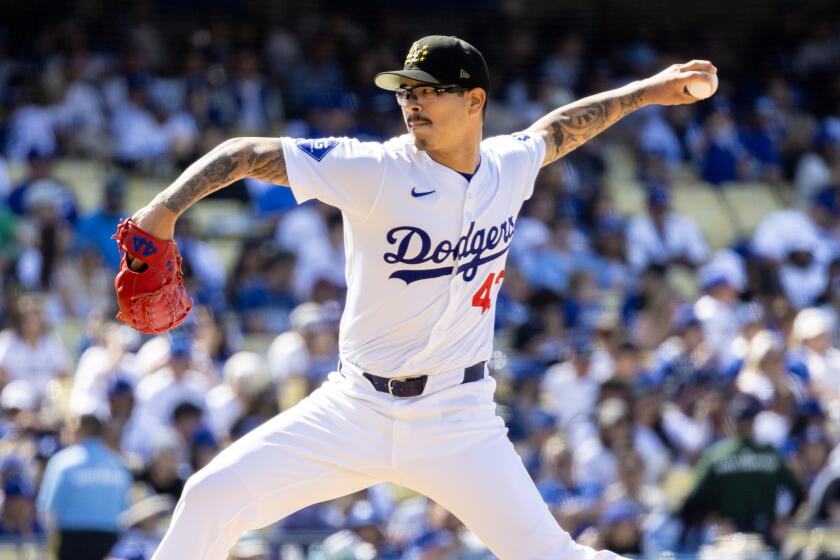Baseball Toughens Policy on Steroids
Baseball owners and players agreed to toughen their anti- steroids policy Thursday, detailing a plan that requires more frequent testing, a wider range of banned substances and harsher disciplinary measures.
Commissioner Bud Selig hailed the new policy as “a historic agreement” in baseball’s efforts to rid itself of illegal substances, but it was derided by outside experts as too lenient -- especially compared with the standard used in the Olympics, where athletes are banned for two years after one positive test. Experts also complained that it did not ban amphetamine use, which they contend is widespread in baseball.
Sen. John McCain (R-Ariz.), among the most outspoken Washington officials in pressing for tougher rules against steroid use, called it a “significant step in the right direction,” but expressed disappointment that it was not tougher.
“No, it’s not everything that I had wanted, but it’s certainly significant progress,” McCain told reporters on Capitol Hill. But he added he would not pursue legislation forcing higher drug-enforcement standards, as he had threatened last month.
The union agreed to reopen the contract last month after grand jury testimony by Barry Bonds and other top players was leaked to the San Francisco Chronicle. The players had testified in a federal investigation of the Bay Area Laboratory Co-Operative, whose founder and three other men -- including Bonds’ personal trainer -- have since been charged with steroid distribution.
The changes, negotiated by union head Don Fehr and baseball’s Rob Manfred, were announced in Scottsdale, Ariz., after they were approved by major league owners during their annual meetings. The policy, which needs approval of the union’s membership, focuses on:
* Testing. During spring training and the regular season, players will be subject to at least one unannounced test. A random, computer drawing will select players for additional tests, both in and out of season. A player will be tested whenever he is selected, without regard for previous tests, and there is no maximum number.
* Off-season compliance. The tests are unannounced and without regard to locale. Players who live outside the United States are no less likely to be tested.
* Banned substances. Previously, baseball tested for steroids only. The new program bans all performance-enhancing substances regulated by the federal government currently and in the future. The list includes human growth hormone, ephedra, designer steroids, diuretics and masking agents. But human growth hormone won’t be detected in baseball’s testing of urine samples -- it is found only in blood tests.
* Stronger penalties. A first positive result would bring a 10-day suspension without pay, a second 30 days without pay, a third 60 days without pay. The player would be suspended for a year with a fourth positive test. Thereafter, the commissioner would determine discipline, including a lifetime ban. (Under the old agreement, the first positive test resulted in treatment, and players didn’t face a one-year ban until the fifth offense.)
“This has been an issue that has deserved attention,” Fehr said. “We’ve all learned since [2002], over the last couple of years, and the last year especially.”
Selig said the game had taken an important step toward a “zero-tolerance policy” against performance-enhancing drugs.
“I regarded them as not only a health issue, but certainly you can say it’s an integrity issue in the sport,” Selig said. “I felt an obligation ... that someday somebody could say, ‘You people knew about this and didn’t do anything about it.’ That would be something I couldn’t live with.”
McCain said he would still like to see further improvements.
“The message here to every high school athlete in America [is], ‘You don’t have to take steroids or performance-enhancing drugs in order to make it in the major leagues,’ ” he said.
McCain said he would have liked the penalty for a first offense to be more severe than a 10-day suspension -- he said he favors a 10- to 15-game suspension for a first offense -- and he would have liked to see a player banned from baseball for a fourth or fifth offense.
The new policy is roughly in line with those used in the National Football League and the National Basketball Assn.
Experts in the field of performance-enhancing drugs, including World Anti-Doping Agency President Dick Pound, said baseball’s policy, albeit stronger, was still critically weak.
“What is it about it that they don’t want to do?” he asked. “You have to say, look, everybody with an IQ over room temperature knows there’s a serious problem.”
The baseball players’ union is regarded as the most powerful in sports. Fehr and Selig noted the union was under no legal obligation to reopen its basic agreement, which does not expire until December 2006. The new drug policy will expire in December 2008.
Gary Wadler, a Long Island physician, professor at New York University Medical School and one of the nation’s leading antidoping experts, also condemned the policy for omitting amphetamines.
“It’s a metaphor for the whole approach that they left out amphetamines,” he said. “I predicted this would happen, and it has: Baseball would come out and say, ‘We’re happy we moved in the direction of the minor league program.’ The Players’ Assn. would say, ‘We opened the [collective bargaining agreement] midway through to deal with this unprecedented situation.’ Congress would be happy the weight of their words made them move. And the public would feel happy they can move on.
“The only problem is, the devil is in the details.”
Manfred said amphetamines were discussed during negotiations, but the focus “was really performance-enhancing substances in terms of muscle building. Stimulants are a complicated area. Are they performance enhancing? How should they be regulated?” The matter was put to baseball’s health policy advisory committee, he said.
Selig’s stated goal was to bring major league testing more in line with the 3-year-old program of testing minor leaguers, who are not protected by the union. That policy, for example, instituted year-round testing, though apparently it rarely, if ever, has been enforced.
Outfielder Barry Wesson, who has spent all but two months of an 11-year baseball career in the minor leagues, said he was not tested in the off-season, adding, “I’ve never heard of any players who were.”
A high-level baseball official, speaking on the condition of anonymity, granted that the off-season testing was financially and logistically difficult, particularly in regard to foreign players, but said that it served as a deterrent.
“I guarantee there will be enough [off-season] testing under the major league program to bring legitimacy to the threat,” the official said.
After having Bonds, Jason Giambi and Gary Sheffield linked to the BALCO case, the scandal coming shortly after an era in which 50-home-run seasons and thickly muscled players became commonplace, baseball readdressed the issue.
“It’s a credibility issue for everybody,” said Larry Baer, executive vice president and chief operating officer of the San Francisco Giants. “What we have is a sport here, and sports have to be credible. I think a policy like this provides the fans -- that’s our mother’s milk, the fans -- with credibility. That’s an imperative. That’s a ground rule of the sport, that you have credibility when somebody buys a ticket and watches a game.”
If nothing else, he said, “That policy is light-years beyond where we were.”
*
(BEGIN TEXT OF INFOBOX)
Baseball pumps up the penalties
Major League Baseball announced a stricter steroid-testing program Thursday to deal with health and integrity issues. The agreement runs until December 2008.
Penalties for positive tests for steroid use in various sports
Major league baseball
*--* First Offense Second Third Fourth Fifth New 10 days 30 days 60 days 1 year League decision Old Counseling 15 days 25 days 50 days 1 year
*--*
Other sports
*--* Minor league baseball 15 games 30 games 60 games 1 year Lifetime NFL 4 games 6 games 1 year 1 year 1 year NBA 5 games 10 games 25 games 25 games 25 games Olympics 2 years Lifetime
*--*
Source: AP / Los Angeles Times
*
Times staff writers Richard Simon in Washington, Bill Shaikin in Scottsdale, Ariz., Alan Abrahamson and Mike DiGiovanna and special correspondent Ross Newhan in Los Angeles contributed to this report.
More to Read
Go beyond the scoreboard
Get the latest on L.A.'s teams in the daily Sports Report newsletter.
You may occasionally receive promotional content from the Los Angeles Times.










